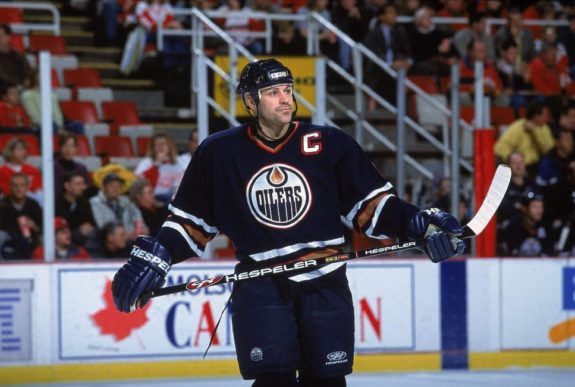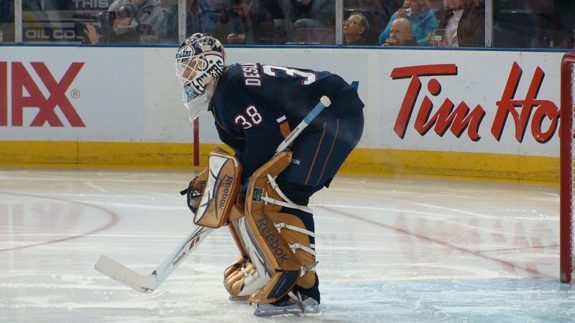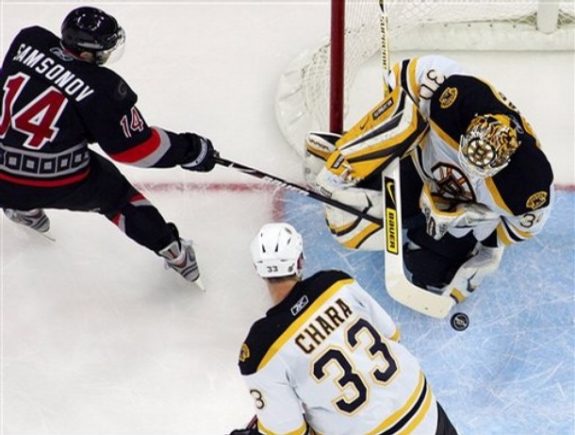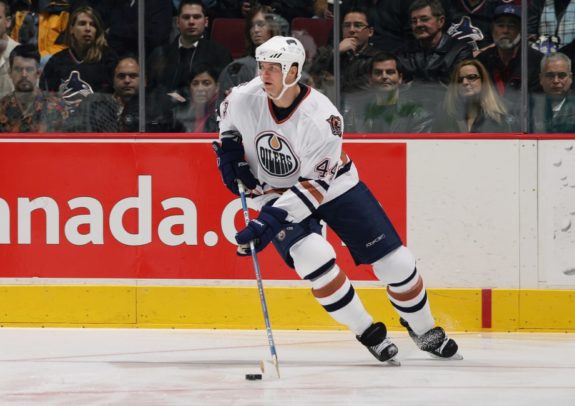No list of the greatest players in Edmonton Oilers history is complete without Doug Weight. While he never won a Stanley Cup with the Oilers, he was the team’s best player for almost a decade and led Edmonton to multiple first-round playoff upsets in the late 1990s.
The New York Rangers dealt Weight to the Oilers in exchange for Esa Tikkanen on March 17, 1993. Weight quickly packed up his gear and sticks and moved down the hallway to the visitors’ dressing room at Madison Square Garden, as the Oilers were in town to play the Rangers that night.
Although he didn’t register a point in his Oilers’ debut, he helped his new club pick up a 4-3 win on the road. It was the first of his 627 combined regular season and playoff games in an Oilers’ uniform.
Weight’s Legacy in Edmonton
Weight displayed elite vision and hockey sense, outstanding passing ability, great puck skills, strong skating ability, plenty of grit and quality leadership. The Warren, Michigan-native reached 100 points once, 90 points twice, 80 points three times and 70 points six times with the Oilers.
Related: Edmonton Oilers With 100-Point Seasons
No. 39 also led the team in scoring seven times (only Wayne Gretzky has led the franchise in scoring more times with nine), played in three NHL All-Star Games and was named captain in 1999.

Weight ranks 14th in goals (157), sixth in assists (420), seventh in points (577), tied for 13th in power-play goals (39), second in power-play assists (207), fifth in power-play points (246), ninth in shots on goal (1,405), 16th in games played (588), tied for 19th in playoff in goals (10), tied for 15th in playoff assists (23), 17th in playoff points (33) and 36th in playoff games played (39) in Oilers history.
I spent over eight years with the Edmonton Oilers. It’s a passionate hockey city with an unmatched tradition. We had a very close, young team that proudly made the playoffs my last five seasons in Edmonton prior to a salary cap era. And that was a great feat for us. And that was because we had belief in building a core, which had to be done in Edmonton. I really wouldn’t trade my time in Edmonton for anything.
Doug Weight during his United States Hockey Hall of Fame induction speech on Dec. 9, 2013
Unfortunately, Weight’s time in Edmonton came to an end on July 1, 2001, when he was traded to the St. Louis Blues along with Michel Riesen for Marty Reasoner, Jochen Hecht and Jan Horacek.
Then-general manager Kevin Lowe knew the Oilers wouldn’t be able to afford Weight’s next contract, so he traded him one season before he was set to hit the open market.
How the Deal Panned Out for the Blues
On the surface, the Blues won the trade by some margin. Reasoner, Hecht and Horacek had a combined 125 NHL points at the time of the trade, while Weight had recorded the 14th-most points in the league between 1994-95 and 2000-01, with 495.
In 2001-02, Weight finished third on the team in scoring with 49 points in 61 games and helped the Blues qualify for the playoffs. However, after winning the President’s Trophy in 1999-00 and reaching the 2001 Western Conference Final, the Blues took a big step back in Weight’s first season with the club, losing in the second round of the 2002 playoffs.
Related: St. Louis Blues’ Best & Worst Trades
Weight registered consecutive 60-point performances in 2002-03 and 2003-04, but the Blues failed to make it beyond the first round of the playoffs in both seasons. Following the 2004-05 NHL lockout, the struggling Blues moved him at the 2005-06 trade deadline to the Carolina Hurricanes, where he won the 2006 Stanley Cup against his former Oilers.
After winning the Cup with the Hurricanes, Weight re-signed with the Blues as an unrestricted free agent on July 2, 2006. But, when it became clear the Blues needed to rebuild, he was traded, again, to the Anaheim Ducks in 2008. During his two stints in St. Louis, he recorded 295 points in 364 games and provided veteran leadership as an alternate captain.
The Blues were a solid regular season club for the majority of Weight’s time there, but achieved virtually no playoff success.
Lowe Made the Right Moves
Hecht played just one season with the Oilers, tallying 16 goals and 40 points in 82 games in 2001-02. Despite a lack of forwards with much offensive upside, the Oilers traded Hecht to the Buffalo Sabres for a pair of second-round picks in the 2002 NHL Entry Draft.
Lowe used the picks acquired from the Sabres to select goalie Jeff Deslauriers (31st overall, 2002) and over-age centre Jarret Stoll (36th overall, 2002). Deslauriers never lived up to expectations at the NHL level, but Stoll developed into a quality No. 2 centre for the Oilers.

After spending most of the 2002-03 season with the Hamilton Bulldogs in the American Hockey League, Stoll had 10 goals and 21 points in 68 games as a rookie with the Oilers in 2003-04. Following the NHL lockout, Stoll enjoyed a breakout season with 22 goals and 68 points in 82 games in 2005-06, and helped the Oilers reach the 2006 Stanley Cup Final.
Stoll added 10 points in 24 playoff games and scored the clutch double-overtime winner in Game 3 of the 2006 Western Conference Quarterfinal against the Detroit Red Wings. He spent another two seasons in Edmonton before being traded to the Los Angeles Kings on June 29, 2008. Stoll notched 59 goals and 165 points in 286 games with the Oilers and served as an alternate captain.
Related: Edmonton Oilers’ 2006 Stanley Cup Run – A Look Back
Reasoner was once a promising prospect with the Blues’ organization, but his strong numbers at Boston College never transferred to the NHL. Still, he was a decent bottom-six forward in Edmonton for parts of six seasons. Prior to the trade deadline in 2005-06, the Oilers dealt Reasoner and Yan Stastny to the Boston Bruins for Sergei Samsonov and a second-round pick in the 2006 NHL Entry Draft.

While he was surely disappointed to miss out on the 2006 Cup run, Reasoner re-signed with the Oilers on July 4, 2006. Reasoner tallied 45 goals and 121 points in 351 games with the orange and blue.
Samsonov led the Oilers in scoring down the stretch run with five goals and 16 points in 19 games, and was an excellent fit on a scoring line with Jarret Stoll and Raffi Torres. Samsonov added 15 points in 24 postseason games in 2006 and made a beautiful pass to set up Ales Hemsky’s series-winning goal against the Red Wings.
However, Samsonov signed with the Montreal Canadiens as a free agent on July 12, 2006, ending his short but productive time in Edmonton.
Who Won the Trade?
Almost two decades have passed since Weight was traded to the Blues. The deal was supposed to help put the Blues over the top as Stanley Cup contenders. Instead, it was the Oilers who came within an eyelash of capturing their sixth Stanley Cup title in 2006.
Additionally, the Blues traded their captain and franchise defenceman Chris Pronger to the Oilers in the summer of 2005. St. Louis then fell to the bottom of the Western Conference standings in 2005-06, which ultimately led to Weight getting moved as well.

The Blues undoubtedly acquired the best player in the trade, so you could argue they were the clear winners. However, Lowe moved Hecht for a draft pick that turned into Stoll and Reasoner for Samsonov.
Stoll and Samsonov were valuable contributors to the Oilers’ magical run to the Final in 2006, while the Blues won just one playoff series during Weight’s tenure with the club.
Related: The NHL’s Top-50 Russians of All-Time
The Blues only won the Weight trade because they had deeper pockets than the cash-strapped Oilers in the early 2000s. However, once the playing field evened out in the salary-cap era, Lowe outperformed then-Blues general manager Larry Pleau.
So, really, Weight was the real winner because he took home the Cup in 2006.